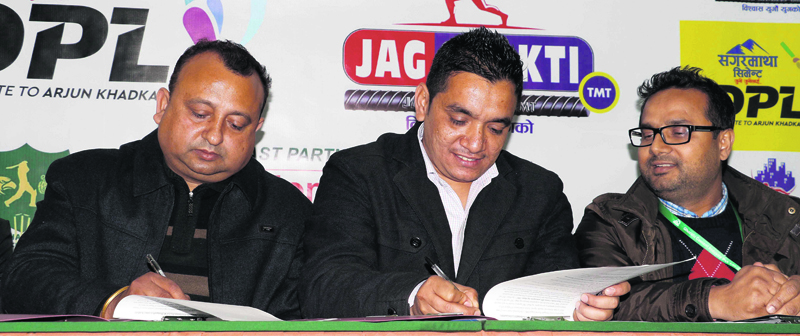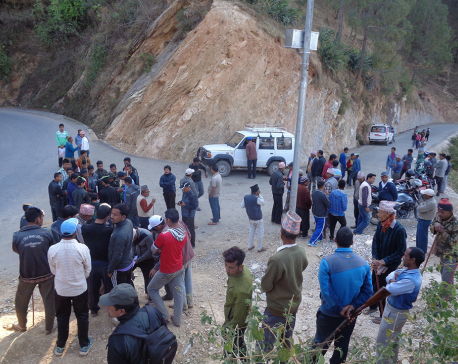
OR

KATHMANDU, Jan 31: Sagarmatha Cement Dhangadhi Premier League (DCL) cricket tournament has tied up with another sponsor Jagadamba Enterprise Private Limited on Tuesday.
Organizer Dhangadhi Cricket Academy (DCA) at a press meet in the capital announced that the Jagadamba Enterprise is now associate sponsor of the tournament which will be named Sagarmatha Cement Dhangadhi Premier League powered by Jag Shakti TMT Bar.
On the same occasion DCA's President Subash Shahi and Jagadamba Enterprises' General Manager Udaya Praksah Mishra inked the deal on behalf of their respective institutions. As per the agreement, Jagadamba Enterprises will provide Rs 700,000 to DCA.
The T20 format tournament scheduled to be held from March 18 to April 1 in Dhangadhi featuring six teams is a cricket event with the highest cash prize. The winner and the runner-up will walk home with a purse of Rs 1.5 million and Rs 700,000 respectively.
After signing the agreement with Jagadamba Enterprises, DCA's President Shahi said that the increasing support from the corporate house will not only help to conduct the tournament successfully but also contributed in overall development of Nepali cricket. “Support from industrial sector to the cricket is positive sign for the growth of overall sports,” said Shahi.
Jagadamba Enterprises' General Manager Mishra stressed on the need of Nepali industrial sector to invest on Nepali sports. “I have always said that corporate sector must spend on sports. Such investment will not just help in the development of sports but it will also help our brands and products to get recognition via sports,” he said.
In the meantime, DCA also has tied up with Dish Home for the live telecast of all the matches of the tournament. As per the agreement, Dish Home's sports channel will telecast all matches live from Dhangadhi. DCA's Shahi and Dish Home Managing Director Kalyan Adhikari signed on the agreement.
You May Like This

Maoist Center Chair calls for moving ahead hand in hand
KATHMANDU, Mar 24: CPN (Maoist Center) Chair Pushpa Kamal Dahal has called for cooperation to the party's campaign for moving... Read More...

Local joins hand to scare off monkeys
BAITADI, Mar 12: As many as 200 locals of Dashrathchand Municipality gathered near the turn at Kaluwad on Saturday holding sticks,... Read More...

Women work hand in hand to construct a bridge
BHOJPUR, July 23: Women of Okhre -9 at Bhojpur district have constructed a wooden bridge at Bantang River on their... Read More...







Just In
- NRB to provide collateral-free loans to foreign employment seekers
- NEB to publish Grade 12 results next week
- Body handover begins; Relatives remain dissatisfied with insurance, compensation amount
- NC defers its plan to join Koshi govt
- NRB to review microfinance loan interest rate
- 134 dead in floods and landslides since onset of monsoon this year
- Mahakali Irrigation Project sees only 22 percent physical progress in 18 years
- Singapore now holds world's most powerful passport; Nepal stays at 98th











Leave A Comment